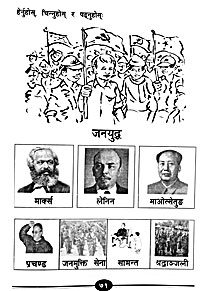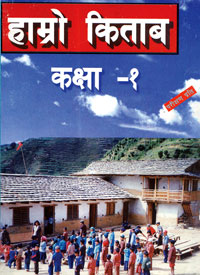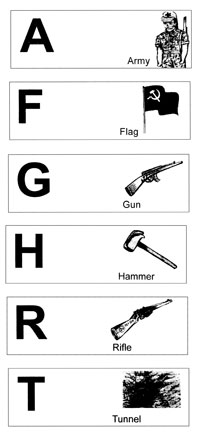 |
From Achham to Bhojpur, the Maoists first opened the schools to educate children of their guerrillas and cadre killed by the state. The orphanages grew into so-called model people's schools as the children grew older, and the teachers were also party cadre.
"It was difficult during the war," recalls Bihani Pun, who runs one such school in Rukum's Kyangshi. "When we heard the army was approaching we had to scatter and hide the children in people's homes."
The children had all been taught a code language. If they heard the teachers say: "The fox is coming, hide the chickens," everyone knew what to do. Bhabana Khadka, who runs a people's school in Sirke in Jajarkot, remembers an army operation four years ago when she had to hide the children in the forests, surviving on berries and yams for a week.
The Maoist People's Education Department together with the Bheri-Karnali regional administration has also brought out a separate 'revolutionary curriculum' for the model people's schools. "The curriculum is strongly influenced by Marxism and has a proletarian orientation, it honours the dignity of labour and patriotism," explains Lal Bahadur G C of the Maoist-affiliated teacher's union. The primary school curriculum has subjects like Nepali and the local mother tongue, art, social studies, military theory, arithmetic, politics, economics, history, culture and English.
 |
The book for Grade One, Hamro Kitab, has a preface by Pushpa Kamal Dahal and is not that different from the 'Mahendra Mala' of the Panchayat era, which 35 years ago had a similarly exhortative preface about Nepal entering a 'new modern age' written by king Mahendra.
The model people's schools have never been registered with the District Eduction Offices, even after the Maoists joined the government. District administrators know very little about these schools nominally under their jurisdiction.
"We have no idea how many there are and where they are," admits deputy secretary of the Ministry of Education in Kathmandu, Hari Shrestha.
 |
Senior Maoist Agni Sapkota says the Maoists will announce their new education policy after a government is formed under their leadership and it will be publicly debated before a strategy paper is issued. "Just like we have agreed with the other parties on political issues, we will discuss the new education policy with them before implementing it,"
he says.
Parents and guardians in Rukum and Rolpa are worried about the future of their children and whether their certificates from the Maoist schools will be recognised. The Maoist leadership, which has been trying to overthrow Nepal's 'bourgeois education' for the past 10 years, seems to have realised that the alternative can't be their model people's schools experiment.
The fact that private English-language schools are opening up in the midwestern hills proves what kind of education most people here prefer. But because most families can't afford these schools, parents say, the quality of government schools must be improved.


